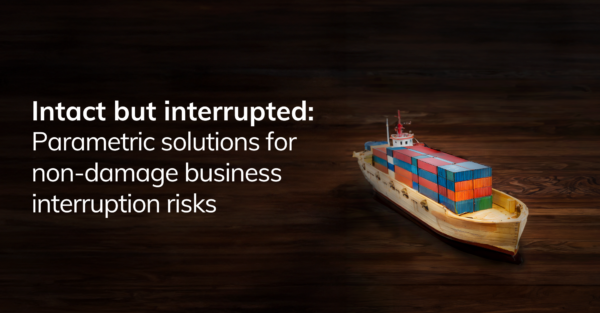Featured reports
Other topics you may be interested in:
Or browse all of the Knowledge Centre:
April 23, 2024
Paper and pixels: Solving hybrid challenges in insurance
InsTech’s report explores the key challenges at each stage of the insurance value chain, including onboarding, underwriting and claims - and how technology can be used to improve these workflows.
April 23, 2024
From analysis to action: supporting sustainable decisions in home insurance
We were joined by Gamma and AXA to find out how they work with insurers to support sustainable decision-making among policyholders, as well as a demo of the platform in action.
April 19, 2024
Carbon insurance – is 2024 the year of action?
In this month’s issue of Climate Risk, we cover the developments in the carbon insurance markets including multiple new projects and funding rounds.
April 18, 2024
Knowledge unlocked: how to use an AI second brain
The insurance industry has a notorious problem with scattered data. We were joined by Christopher Payne, CEO and Co-founder of myReach to discuss how Generative AI is making a new type of knowledge management possible, acting as a second brain for all your knowledge.
April 16, 2024
AI vs AI: tackling insurance fraud
InsTech’s Ali Smedley met with Jed Stone, Chief Revenue Officer at Issured, to discuss the challenges facing insurance claims investigation teams and how the company is using artificial intelligence to overcome them.
April 12, 2024
15 ways to become the perfect panel host…
Matthew Grant writes about what makes a great panel host, tapping into the wisdom he has gained after hosting over 500 panel discussions, interviews or podcasts in the last 6 years.
April 5, 2024
Generative AI in Practice – Issue 9
As this month’s issue of Generative AI in Practice considers how to insuring GenAI will change in the future, and touches on our upcoming Live Chat with myReach - a platform that interconnects your data, allowing you to ask questions in natural language to help you find insights tailored to your needs.
April 2, 2024
Generative AI – from experimentation to implementation
We brought together three speakers who have grappled with AI strategies at insurers and brokers to learn what use cases of GenAI are creating value for them today.
April 2, 2024
From data to decision: how insurers are using underwriter workbenches in 2024
On 26 March, to coincide with the release of InsTech's latest report about the underwriting workbench landscape, we hosted a webinar to discuss implementation experiences and how insurers are using underwriter workbenches in 2024.
April 2, 2024
The future of underwriting has arrived in New York
Missed out on the event or want a refresh? No problem! Watch seven full panels from our New York event at Google's office featuring speakers from Google Cloud, Kroll, hyperexponential, Sompo International, K2 Cyber, Cytora, Guidewire, Tokio Marine HCC, Allianz Commercial, Zurich and Brewer Lane Ventures.
March 31, 2024
Insurer-led innovation
Matthew Grant spoke to HDI TH!NX 's founder Verena Brenner on developing a startup whilst working in an insurer, and scaling the business into a successful model helping insurers understand their risks better.
March 28, 2024
Parametric travel insurance goes global – The Parametric Post Issue 68
Many companies have designed parametric insurance products for consumers, but few have been successful at scale. Travel insurance is one of the early success stories. With recent announcements of new partnerships, we can expect parametric travel insurance to grow faster in the next few years.
March 26, 2024
From data to decision: how insurers are using underwriter workbenches in 2024
The experience of early adopters has proven that underwriter workbenches can make insurance companies more productive.
March 26, 2024
Getting ahead of the risk curve – future proof your risk management strategy
Missed out on the event or want a refresh? No problem! Watch four full panels from the event featuring speakers from Kroll, S&P Global Market Intelligence, KPMG, Generali, IncubEx and Landsec.
March 25, 2024
Drowning in documents: how to make working in insurance more rewarding
Join us for a fireside conversation between two insurance industry and wellbeing experts as they discuss how legacy systems and employee morale go hand-in-hand and what the industry can do in the future to change.
March 24, 2024
Managing your flood risk – stories from the frontline
This week, Matthew Grant spoke to Previsico's Dr Avi Baruch and a few of his clients at Zurich and Donaldson Timber.
March 22, 2024
Where will be hit the hardest by climate change?
In this month’s issue of Climate Risk, we cover the which countries will be most at risk of higher property damage losses due to climate change.































